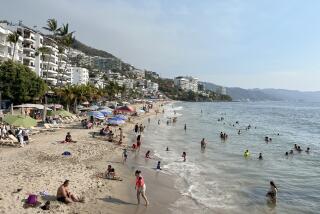U.N. Warns Cambodians Against ‘Pressure’ : Asia: Peacekeepers have been targets of violence. Breakaway ‘autonomous zone’ is announced.
- Share via
PHNOM PENH, Cambodia — The United Nations warned the Phnom Penh regime Saturday against escalating an increasingly violent pressure campaign targeting U.N. peacekeeping officials.
A U.N. spokesman said those involved in the campaign hope “to apply direct pressure” on U.N. peacekeepers in Cambodia. “This is not acceptable, and the international community is sure to react to further provocation,” he said.
The warning came as Prince Norodom Chakrapong, a senior official of the Phnom Penh government, announced to 800 demonstrators in southern Svay Rieng the formation of a breakaway “autonomous zone” including seven provinces in eastern Cambodia.
The announcement is the latest in a series of incidents apparently coordinated by the Phnom Penh government after its defeat by the opposition royalist party in last month’s national elections. The apparent aim is to compel U.N. peacekeepers to invalidate the results of the voting or to force a power-sharing arrangement.
Chakrapong, who is a controversial son of Prince Norodom Sihanouk, the country’s head of state, said the new autonomous zone would include the provinces of Kompong Cham, Kratie, Mondolkiri, Ratanakiri, Stung Treng, Svay Rieng and Prey Veng--about 40% of country.
The U.N. spokesman said Chakrapong sent a letter to the U.N. Transitional Authority in Cambodia (UNTAC) in Prey Veng province stating that U.N. vehicles would no longer be allowed into the province and that U.N. aircraft would be barred from flying over “security areas.”
The spokesman said the letter warned that the safety of U.N. personnel could not be guaranteed unless the order was implemented.
U.N. civilian police monitors were evacuated from towns in Kompong Cham and Svay Rieng provinces after soldiers from the Phnom Penh regime threatened them and started firing weapons, the spokesman said.
Sihanouk said on national television that U.N. personnel should be withdrawn from the breakaway provinces for their own safety. Later, Yasushi Akashi, head of the U.N. peacekeeping effort here, announced that civilian personnel would be withdrawn but the U.N. military presence would stay.
In Phnom Penh, Premier Hun Sen denounced the U.N. radio station and warned that if it continued to broadcast what he called “insinuations” against his party, he would not be held responsible for the outcome, including “the destruction of Radio UNTAC.”
The U.N. spokesman said he believes the incidents “are merely a temporary expression of disappointment on the part of a few individuals” after last month’s elections and said there is no evidence of popular support for the anti-U.N. activities.
Chakrapong, a deputy premier in the Phnom Penh government, leads a movement of disgruntled officials of the regime who were angered at the victory of the royalist opposition party in the U.N.-supervised elections.
On Thursday, he resigned from his seat in the new Constituent Assembly and left with the minister of national security, Gen. Sen Song, to form a secessionist government in three provinces. Now the area claimed has grown to seven provinces.
The Phnom Penh government has demanded an investigation into alleged irregularities in the voting that it said deprived it of victory. But the United Nations has steadfastly maintained that there was no evidence of election fraud.
On Monday, the country’s first freely elected Assembly in nearly four decades begins work on a new constitution. The royalist FUNCINPEC party has won 58 seats in the 120-seat Assembly, compared with 51 for the Phnom Penh regime’s Cambodian People’s Party.
More to Read
Sign up for Essential California
The most important California stories and recommendations in your inbox every morning.
You may occasionally receive promotional content from the Los Angeles Times.










